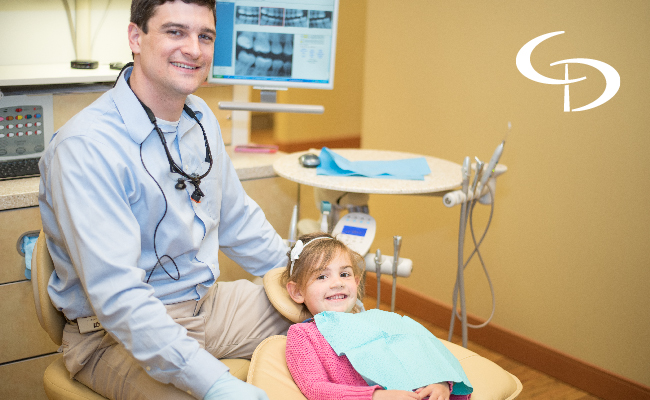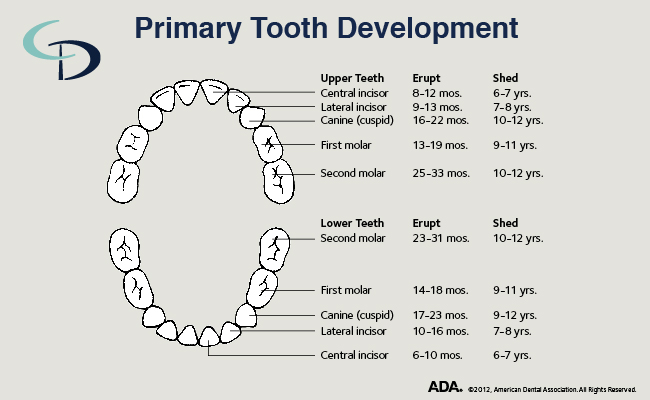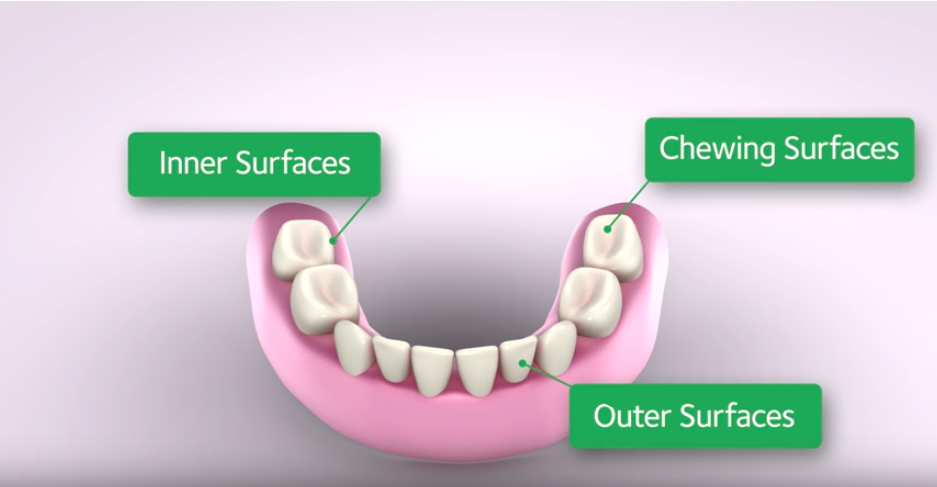At Chesney Dentistry we are a true family dental office – and we welcome patients of all ages, including children! We are often surprised that many of our patients don’t know that we see children. We love seeing children!

February is National Childrens’ Dental Health Month so we want to pass on some tips for helping your child have a healthy smile for life. Find out what to expect at your child’s first visit to Chesney Dentistry here.
As a parent or caregiver you know how important it is to help a child develop healthy habits. Good dental health is important in giving your child a healthy start in life. If dental disease is not caught and treated, it can cause serious health and cosmetic problems. This information can help as you figure out how to best support your child with their dental health needs. And, of course, we are always happy to answer any questions you may have during (or after) your dental visits.
Let’s start with your baby’s first teeth:
Primary teeth (baby teeth) are very important (even though they are ultimately going to fall out). They help your child chew, smile, and speak normally. Those baby teeth also hold space in the jaws for the permanent adult teeth that come in later! (The human body is so cool.) All the primary teeth are already present, just not erupted (through the gum) into their mouths when your baby is born. Typically the primary teeth start to come in at the age of 6 months. But don’t worry if your child doesn’t have any teeth by the time they are 6 months old, every child is different and some baby teeth come in much sooner, or much later, than 6 months. By 3 years of age most children will have a full set of 20 baby teeth

As the baby teeth fall out, the jaw now has room for the permanent teeth which start to come in around the age of 6. By the time your child is a teenager, she will likely have all her adult teeth.

Cavity Prevention in Children
Teeth are unique parts of the body because, unlike most things in the human body, they cannot heal themselves. This is why prevention is so important when it comes to tooth decay.
Tips to help keep your child’s teeth healthy and cavity-free:
- Brush those teeth! Clean your child’s teeth daily. It is most important to brush and floss right before bed to remove all the plaque and food from the day, but we also encourage parents to brush their children’s teeth in the morning as well. When plaque on teeth uses the sugar in foods and drinks, that acid can attack the teeth for 20 minutes or longer. These attacks weaken tooth enamel. Over time tooth decay can develop and a cavity can form.
- Never put your child to bed with a bottle of milk. Milk has sugar in it and letting that soak in the baby’s mouth throughout the night is very bad for their teeth.
- Avoid sugary liquids and foods as much as possible (including juice drinks). If your child does get juice, or sugar, try and not to let them sip or chew on it for a long period of time. It’s much better for their teeth if the exposure to sugar is limited.

Brushing your child’s teeth
- Start brushing your child’s teeth once the first little tooth comes through. Use a soft bristled, child-sized toothbrush.
- You don’t need a lot of toothpaste! If your child is 3 years old and under the ADA recommends no more than a grain-of-rice-sized amount of fluoride toothpaste. For children age 3 to 6, use a pea-sized amount of fluoride toothpaste. Around age 3 you can start teaching your child to spit out the toothpaste instead of swallowing it. Letting them watch you brush your teeth also helps them understand how to do it.
It is also recommended that an adult brushes the child’s teeth until he or she is at least 6 years old. It’s really important to make sure all the surfaces of the teeth are being cleaned and sometimes children have a hard time with this. You’ll probably know when your child is ready. When they are ready, we recommend that you watch them for a while to make sure they don’t skip, or shorten, brushing. Getting good habits in place early in life is helpful so they always know to brush twice a day for two minutes.
Don’t forget to floss! When your child has two teeth that touch this means it’s time to start flossing. Flossing can be tricky so make sure you help your child until you feel like they are able to do it well on their own. If you feel like you could use some pointers, next time you’re at Chesney Dentistry ask your hygienist or Dr. Chesney to show you some tips and tricks for flossing your child’s teeth. We’d be happy to help!
Sucking habits
When should you cut your child off from the pacifier or sucking on his or her thumb? Sometimes there is a perception of the dentist being “mean” when we have to give this kind of news, but really it is a good thing! (Really!) Sucking is a natural reflex in children and can make them feel safe, happy and relaxed. Long-term sucking habits, however, can cause some problems with tooth alignment and even improper growth of the mouth.
Sucking habits usually stop between the ages of 2 and 4. If your child uses a pacifier or sucks his or her fingers, talk to your dentist about how to break your child of the habit. We can also tell you if the pacifier or thumb sucking is starting to effect their teeth.
Talk to us about planning your child’s first dental visit! We have a blog post that explains what you can expect at their first visit. Read it here.
Hope this has given you so usfule tips and tricks for giving your child a great start with their dental health. Look forward to seeing you at your next appointment!
-Dr. Nathan Chesney, DDS
Chesney Dentistry
TIP: Children learn healthy habits from their parents and caregivers.
You can help your child learn healthy dental habits by cleaning their teeth daily, taking them to the dentist regularly, and giving them healthy foods. Teaching children good dental care easily is a great way to set up healthy habits for life.
ADA healthy smile tips:
- Brush your teeth twice a day with a fluoride toothpaste
- Clean between your teeth once a day
- Eat a healthy diet and limit snacks
- Visit your dentist regularly (every 6 months!)
Source: ADA Mouth Healthy







